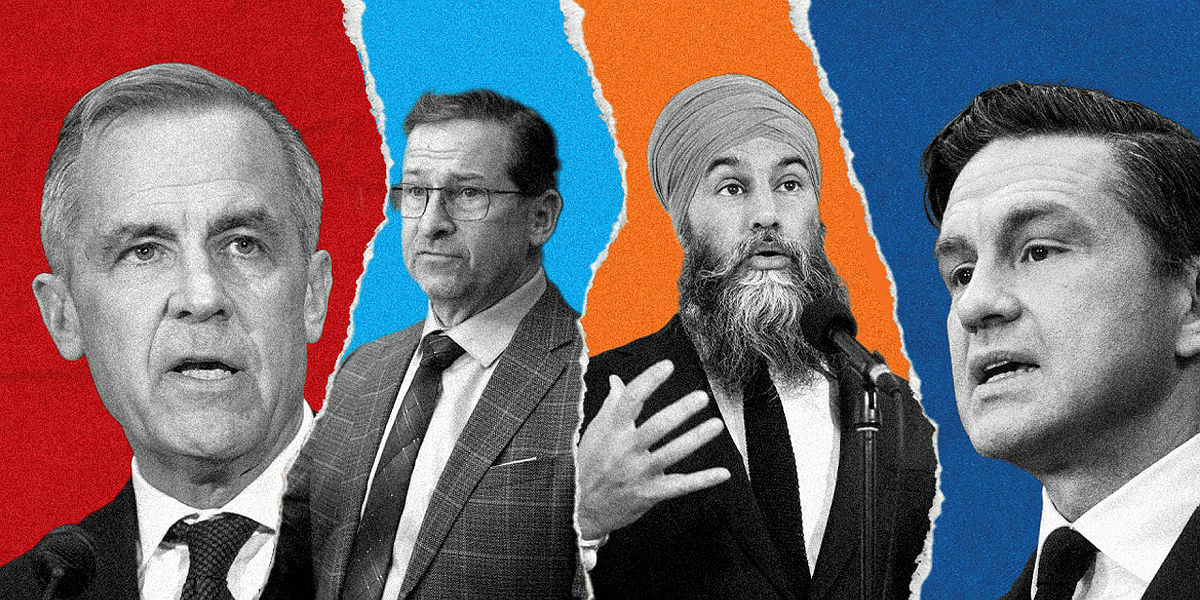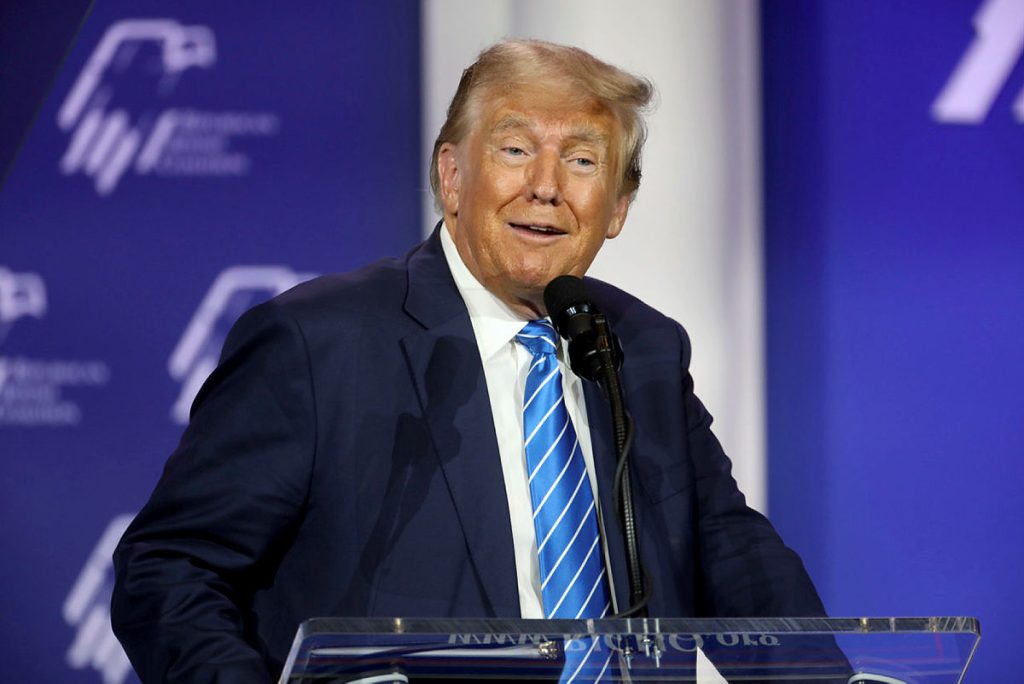Despite dip in polls, Conservative path to victory remains possible, say political players

The ongoing trade war with the United States and Justin Trudeau’s exit as prime minister have significantly altered the political landscape for Conservative Leader Pierre Poilievre, but some believe his path to victory lies in a sharp focus on the cost of living and trade tariffs, placing their hopes on the upcoming leaders’ debates—where they expect him to “wipe the floor” with Liberal Leader Mark Carney.
“This certainly isn’t the sprint to glory that we had all been promised and it’s definitely been tough ‘events, dear boy, events’ for sure, as part of it, but still there’s a path to victory,” said one former senior Conservative, who spoke to The Hill Times on not for attribution because they were not authorized to speak on this subject. “Poilievre should wipe the floor with Carney [in the debates].”
Since early January, the Liberals have surged from a 25-point deficit to holding a lead that ranges from single to double digits, depending on the poll. Since the writ was dropped for the current election campaign, the Liberals have consistently led in most polls, often within majority government territory. However, with two weeks remaining until election day, there’s still room for shifts in voter sentiment.
The Liberals’ dramatic bounce back is largely attributed to Trudeau’s announced departure, the trade war sparked by U.S. President Donald Trump, and the president’s controversial remarks about potentially annexing Canada.
Before this resurgence, Poilievre’s Conservatives had enjoyed a solid two-year lead in the national public opinion polls, often by double digits. But Trump’s on-again, off-again tariff threats and inflammatory rhetoric have significantly altered the political landscape.
The source said that, internally, the senior campaign team is convinced that the cost of living is the winning election issue for their party. But Kory Teneycke, a veteran Conservative insider who has won three back-to-back elections for Ontario Premier Doug Ford, said that the trade war with the United States has become a critical issue for Canadians, but Poilievre has not given it the attention it deserves. On the other hand, the Carney Liberals are campaigning on this issue. If the Conservatives fail to shift their focus, they could lose the next election.
“It’s like everyone in Canada has gotten together and said, ‘Where are we going to go for dinner tonight?’ And everyone agreed, ‘Let’s go for Italian,’ and what Pierre is offering is a trip to the Mandarin buffet,” said Teneycke in a speech at the Empire Club in Toronto last month, according to The Toronto Star. “His pitch is, ‘Well, there’s some sad pizza over in the corner, and we’ve got spaghetti and meatballs, also a little sad, but we’ve got sushi and we’ve got General Tsao’s chicken and we’ve got chicken fingers and fries and soft serve ice cream,’” he said. “And everyone’s like, ‘But I want fucking Italian.’”
And last week on the Curse of Politics podcast, Teneycke said the federal Conservative strategists were conducting “campaign malpractice at the highest fucking level.” Said Teneycke: “This campaign is going to be studied for decades as the biggest fucking disaster in terms of having lost a massive lead.”
According to a recent poll by Ipsos Research, if an election were to happen now, the Liberals would get 46 per cent of the votes, followed by the Conservatives who would get 34 per cent, the NDP 10 per cent and the Greens three per cent. The poll of 1,000 Canadians was conducted between April 1 and April 3 and had a margin of error of plus or minus 3.8 percentage points, 19 times out of 20.
A Nanos Research poll suggested that the Liberals had the support of 42.8 per cent of Canadians followed by the Conservatives at 38.6 per cent, the NDP at 8.5 per cent, and the Greens at 2.3 per cent. The three-day rolling poll of 1,239 Canadians was released on April 9.
Darrell Bricker, CEO of Ipsos Public Affairs, said that It’s unclear whether the Liberals have already reached their peak in the polls, or if their lead will continue to grow. At the moment, the Conservative Party’s base remains highly energized. Meanwhile, Bricker said that Carney is leading a fragile coalition of progressive voters—many of whom have defected from the NDP and Greens in an effort to block a potential Poilievre government. This coalition also includes voters who initially sought change through Poilievre, but have since shifted their support to Carney.
Bricker said that Poilievre isn’t avoiding talking about Trump. Rather, he spent the past two years positioning himself as a populist, similar in style to other populist leaders around the world. Poilievre campaigned on themes of change and dissatisfaction with the country’s direction, which placed him within a specific political frame and comparisons have been made between Trump and Poilievre.
But since Trump’s election as U.S. president, the ballot question has shifted. Now, voters are less focused on who can deliver change and more concerned with who is best equipped to lead the country through challenging times. He predicted that the polling numbers are expected to get tighter close to election time, as this is a high-stakes election and people will take their time to make a final decision who to vote for.
“It’s fear, it’s a real sense that the country and our future is in jeopardy,” said Bricker. “As we move from a debate about who’s best able to deliver change to who’s best able to deliver the country the type of leadership they need to go through the difficult times that we’re experiencing.”
Nik Nanos, chief data scientist for Nanos Research, said that right now, two competing ballot questions are shaping the election: who is best equipped to handle Trump, and who can best address the cost of living. It’s still too early to determine which of these will ultimately determine the election outcome, but that clarity will come as voting day approaches.
On the first question, Carney holds an advantage over the Conservatives, Nanos said. On the second, the Conservatives are seen as having the upper hand over the Liberals. Nanos predicted that a significant portion of voters will make their final decision in the last three days of the campaign, based on which ballot question they believe matters most at that moment.
“People are going to be a lot like last-minute holiday shoppers,” said Nanos. “There’s going to be more last-minute holiday political shoppers this particular election as they wait to see how both the two frontrunners perform over the course of the campaign. They’re going to want to wait to the whole election before they make their final decision, which speaks to another level of volatility in the electorate.”

Nanos said that many voters are holding off on making a final decision due to the uncertainty surrounding the Trump factor and its potential impact on the economy. They want to see how both frontrunners would respond to a possible crisis before casting their vote.
In a typical election, 38 per cent support would put the Conservatives in a strong position to win. But this time, the dynamics are different: NDP support has collapsed, and both the Bloc and the Greens are polling lower than usual. As a result, 38 per cent isn’t enough to secure a victory.
Compounding the challenge is the inefficiency of the Conservative vote—it’s heavily concentrated in the Prairie provinces, where they win by large margins, but that doesn’t translate into more seats elsewhere in the country. By contrast, the Liberal vote is more efficiently distributed across ridings.
So far, Poilievre’s campaign has been largely one-dimensional, concentrating almost entirely on the cost of living. According to Nanos, the campaign needs to broaden its scope by addressing how Poilievre would manage Canada-U.S. relations.
Nanos said he believes Poilievre is avoiding any spotlight on Trump because that area is a strength for Carney. He, however, said that Poilievre needs to show Canadians that he has a stronger plan for dealing with Trump—without necessarily criticizing the U.S. president.
“They [Conservatives] need to say everything that they’re saying, but they need to add a new dimension in terms of Pierre Poilievre and managing the binational relationship and navigating a Donald Trump administration,” said Nanos. “If he can come down with that extra punch, he can win the election.”
arana@hilltimes.com
The Hill Times






 LICENSING
LICENSING PODCAST
PODCAST ALERTS
ALERTS













